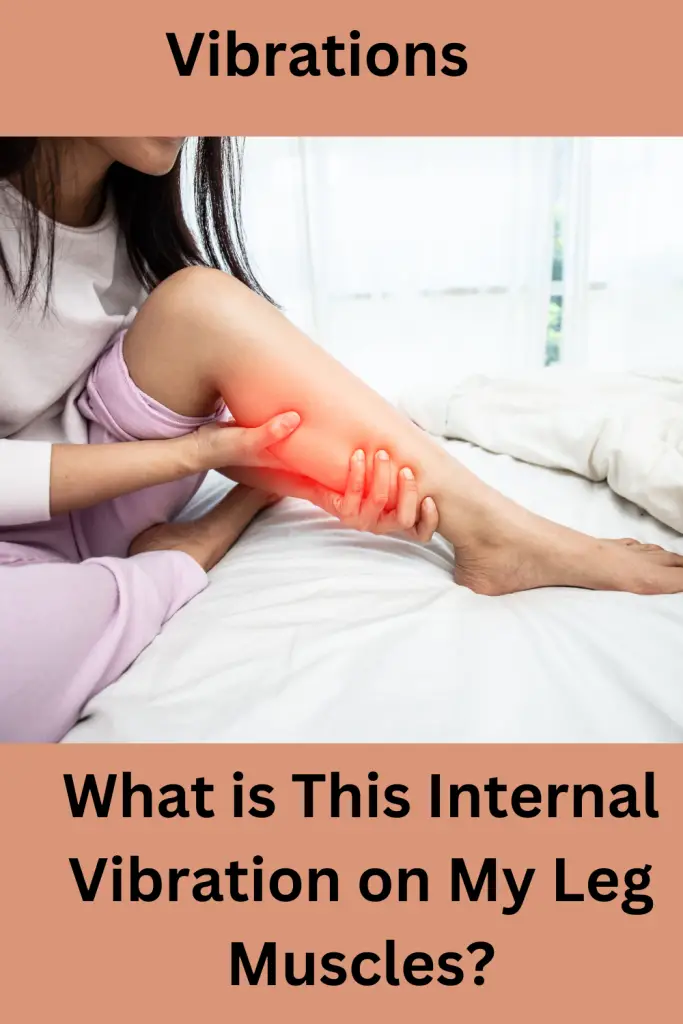Internal vibrations in leg muscles can be a puzzling sensation, but they’re usually not a cause for major concern. These vibrations often feel like a slight trembling or quivering deep within the muscles of your legs. While they can be bothersome, they are often benign and temporary.
What is This Internal Vibration on My Leg Muscles?
- Muscle Fatigue: When you engage in physical activities that involve your leg muscles, such as running, walking, or exercising, they can become fatigued over time. Muscle fatigue occurs when muscles are overworked or not given enough time to recover. This can lead to involuntary contractions and vibrations within the muscle fibers. These vibrations can feel like a subtle trembling or quivering deep in your legs.
- Dehydration: Proper hydration is essential for the optimal functioning of muscles. When your body lacks adequate water intake, electrolyte imbalances can occur. This can lead to muscle twitching and cramps, including the sensation of vibrations. Electrolytes like potassium, sodium, calcium, and magnesium play a crucial role in muscle contraction and relaxation.
- Stress and Anxiety: High levels of stress and anxiety can cause muscle tension throughout the body, including the leg muscles. When muscles are tense, they can become more sensitive to even small stimuli, leading to sensations of vibrations. The body’s “fight or flight” response to stress can also result in muscle contractions and tremors.
- Vitamin Deficiencies: Certain vitamins, particularly B vitamins (such as B12 and B6) and magnesium, are vital for maintaining proper nerve and muscle function. Inadequate intake of these nutrients can disrupt the communication between nerves and muscles, leading to muscle twitches and vibrations. These deficiencies can be caused by poor dietary choices or certain medical conditions.
- Caffeine or Stimulants: Caffeine and other stimulants have the potential to overstimulate the nervous system. Excessive consumption can lead to heightened nerve sensitivity, causing muscles to contract involuntarily. This can manifest as muscle twitches and vibrations, especially in the legs.
- Nerve Irritation: Irritation or compression of nerves in the legs can disrupt the normal signals sent between nerves and muscles. This can result in abnormal muscle contractions and vibrations. Nerve irritation can be caused by factors such as injuries, poor posture, or conditions like sciatica.
- Restless Leg Syndrome (RLS): Restless Leg Syndrome is a neurological disorder characterized by an overwhelming urge to move the legs, usually accompanied by uncomfortable sensations such as tingling, itching, or crawling. These sensations can lead to constant leg movement, which might manifest as vibrations. RLS symptoms often worsen during periods of rest or inactivity.

Here is What You Can Do to Prevent Internal Vibrations
- Stay Hydrated: Proper hydration is essential for maintaining the balance of electrolytes in your body, which play a significant role in muscle function. Aim to drink plenty of water throughout the day, especially during physical activities. Electrolytes like potassium, sodium, and magnesium are crucial for preventing muscle twitches and cramps. You can also include hydrating foods like fruits and vegetables in your diet.
- Manage Stress: Stress and anxiety can exacerbate muscle tension and contribute to vibrations in the legs. Engage in relaxation techniques to manage stress and promote muscle relaxation. Deep breathing exercises, meditation, progressive muscle relaxation, and yoga are effective methods. These practices help calm the nervous system and reduce overall muscle tension.
- Balanced Diet: Consuming a well-rounded diet is essential for providing your body with the necessary nutrients to support muscle and nerve health. Focus on foods rich in B vitamins (found in whole grains, lean meats, dairy, and leafy greens) and magnesium (found in nuts, seeds, whole grains, and dark leafy greens). These nutrients aid in muscle contraction, nerve transmission, and overall muscle health.
- Limit Caffeine: Excessive caffeine consumption can contribute to heightened nerve sensitivity and muscle twitching. Consider reducing your intake of caffeinated beverages like coffee, tea, and energy drinks. If you choose to consume caffeine, do so in moderation and be mindful of its potential impact on muscle sensations.
- Gentle Stretching: Gentle stretching exercises can help alleviate muscle tension and improve circulation, reducing the likelihood of muscle vibrations. Incorporate stretches into your daily routine, focusing on the leg muscles. Stretching before and after physical activities can also help prevent muscle fatigue and discomfort.
- Rest and Recovery: Adequate rest and recovery are crucial for maintaining muscle health. Ensure you get enough sleep to allow your muscles to recover from daily activities. Avoid overexertion and give your muscles time to recuperate after intense workouts. Proper rest supports muscle repair and reduces the risk of muscle twitching and vibrations.
- Consult a Doctor: If the sensations of internal vibrations persist, worsen over time, or are accompanied by other concerning symptoms such as pain, numbness, or weakness, it’s important to seek professional medical advice. A healthcare provider can perform a thorough evaluation to identify any underlying medical conditions that might be contributing to the vibrations. They can provide tailored guidance and treatment options based on your specific situation.
Incorporating these recommendations into your lifestyle can contribute to healthier muscles, improved nerve function, and a reduction in the sensations of internal vibrations in your leg muscles. Remember that everyone’s body is unique, so finding the right balance of hydration, nutrition, relaxation, and activity is essential for promoting overall well-being.
Sources
https://pubmed.ncbi.nlm.nih.gov/19923157/
